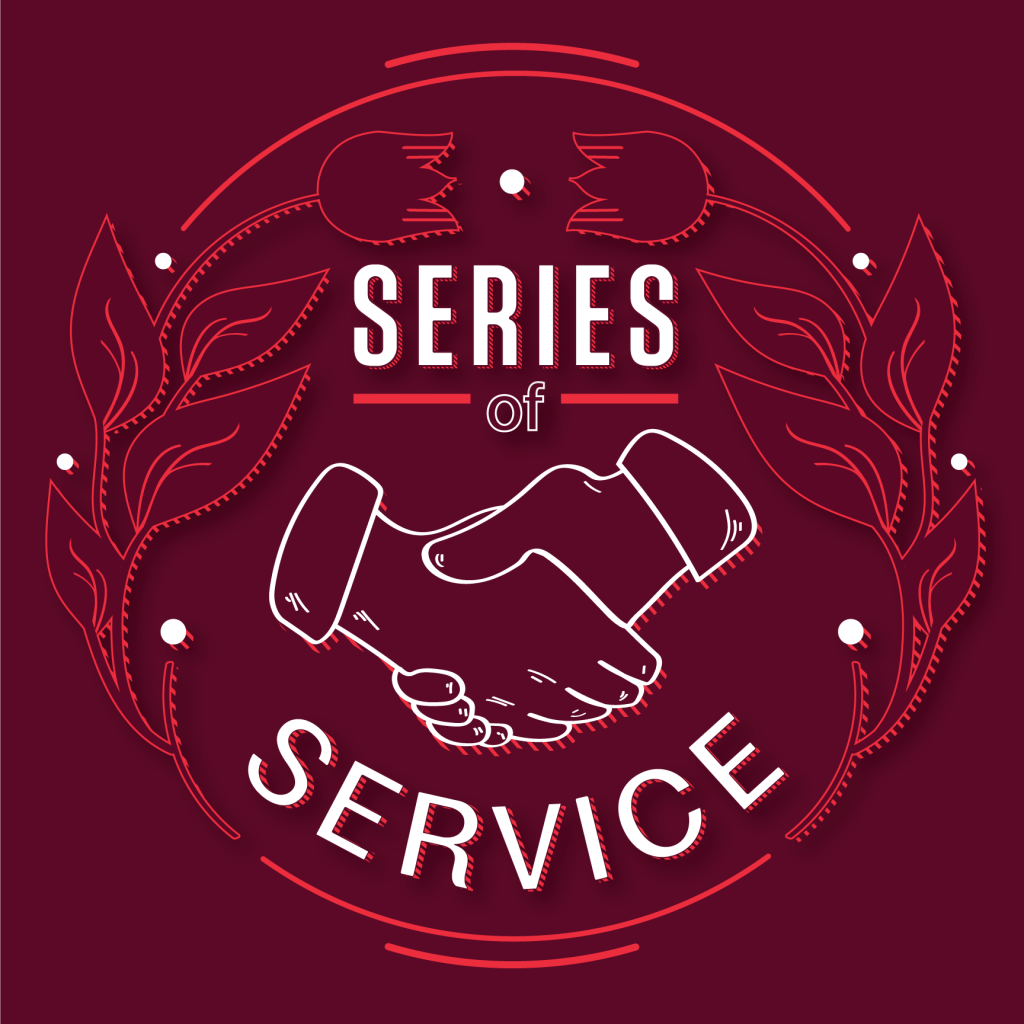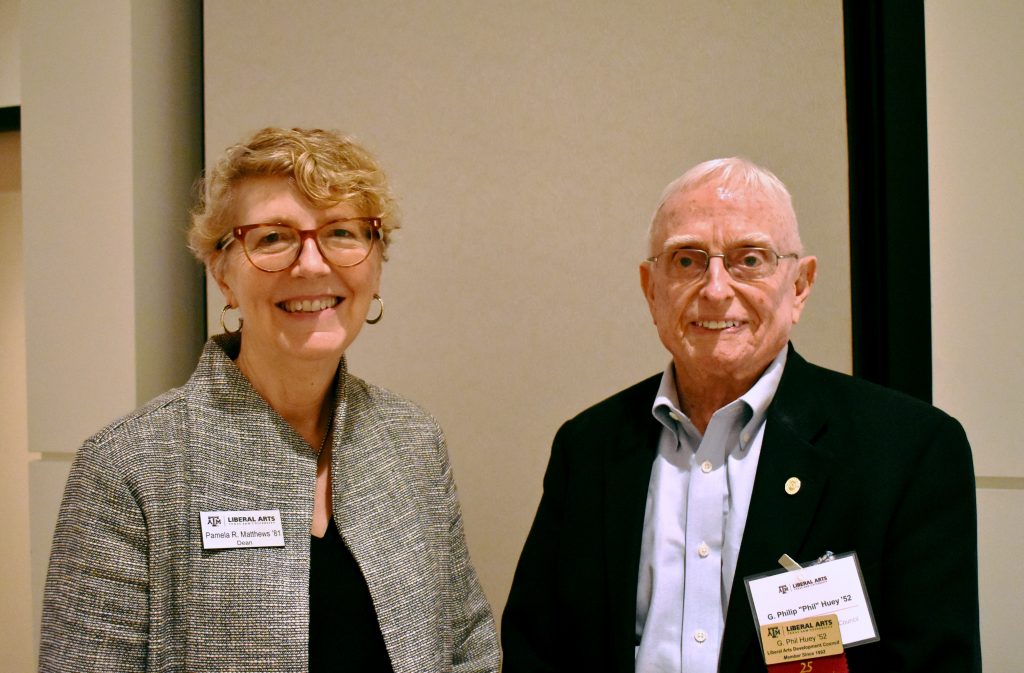G. Philip Huey ‘52: A home-grown Aggie philanthropist
G. Philip Huey ‘52 built a successful career at the Dallas Park & Recreation Department after graduating from Texas A&M University. Today, he gives back to his alma mater by supporting the College of Liberal Arts.

By Rachel Knight ‘18
Editor’s Note: The following is a Series of Service feature from the College of Liberal Arts.
The series highlights individuals who give generously of their time and resources as members of either the Liberal Arts Development Council or the Liberal Arts Advisory Council. Life-long learning and humanities research that matters at Texas A&M University would not be possible without this support.

G. Philip Huey ’52 used his leadership skills and Aggie Values successfully throughout his career. Now he gives back to Texas A&M by supporting the College of Liberal Arts.
When G. Philip Huey ‘52 stepped into his first leadership role in the Dallas Park & Recreation Department in 1966, he noticed two groups missing in leadership roles — women and minorities. He was determined to change that.
Huey always tried to hire people who were more knowledgeable in their specific fields than he was – including hiring both the first women and the first minorities into the park maintenance section. This attitude served Huey well as he was tasked with many different roles before he retired, including assistant director and then interim director of Fair Park (where the State Fair is held), and interim director of the Dallas Zoo.
We chatted with Huey in person to learn more about his story. This interview, which was condensed and edited for clarity, may awe and inspire you.
Tell me a little about your childhood.
I was born in Graham, Texas. After my grandfather died, when I was still very young, my father Phil and Uncle Paul concluded that my step-grandmother just did not know how to manage a farm. After discussing it, they decided it was best for my uncle to remain with his job with Progressive Farmer in Chicago, and for my father to move his family to the farm in Johnson County, near Godley.
Back then, if you started out in a school, even if you moved out of the district, you could still go there if you paid a small tuition. So my parents moved from the farm to an apartment in Cleburne, Texas, just for my first-grade year to get me started in school there, and then moved us back to the farm. The farm was where I really grew up. I attended school in Cleburne through high school, and am still in touch with two of my friends from the first grade, as well as other school friends from that time.
Did growing up on the farm impact your life in anyway?
Oh absolutely! It impacted me from the standpoint of being very sympathetic with farming and ranching. It probably had a good deal of influence on me in picking a major in college and what would be my career. From that early age I was really interested in plants and flowers and identifying them and working with them.
In school, I was the only one until we got to junior high who was living on a farm. I thought, “Oh golly! How fortunate you all are. You live in town and don’t have to worry about the well and whether or not it’s going to pump with the wind.” We had what we called the Delco. It produced power for us to have on the farm, because we didn’t have the Rural Electrification Administration back then. I can remember that sometimes the lights would be kind of yellow, because we couldn’t manufacture a lot. We finally got real electricity in about 1940.
The story I like to tell about that is that we had a Christmas tree. I was only allowed to turn the lights on on that Christmas tree for one minute each night, because we needed the power to run cattle or the dairy or whatever. That was a real privilege that I could see that Christmas tree with the lights on for one minute each night before Christmas.
Why did you decide to study at Texas A&M?
There were probably two reasons. There were only two places that I could study floriculture. One was at Texas A&M and the other was at Cornell. I knew I didn’t want to go up there to study where it was cold all the time. Also I’m not sure that even if I had wanted to go there that we could have afforded to send somebody that far away in another state to study.
Texas A&M was just the logical thing. I didn’t grow up thinking, “I’m going to go to Texas A&M. It’s just fabulous.” I didn’t have that kind of feeling until I got there.
Tell me what life was like on campus when you were a student at Texas A&M.
The most intense memory I have from that first week there is when they were trying to get us all oriented into being an Aggie. A lot of people in administration were talking to us and trying to help us understand what it was like to be an Aggie.
One of them said, “Look at the fella on either side of you.” We were all men, because there were no female students at Texas A&M back then. He said, “Those two will not graduate.” That really got my attention, and I’m sure it got everybody’s attention. Sure enough, there were lots of guys that I was in the barracks with that first year who didn’t come back as sophomores.
I certainly had problems academically all the way through. I was reasonably comfortable in the military lifestyle, which we all had to live with on campus back then. I didn’t have a problem with being organized, and still don’t. Long after I was working in Dallas this close friend of mine said, “Oh, y’all don’t need to worry about that. Philip was born organized.”
How would you compare your experience as a student to what students experience on campus today?
I think that Texas A&M is far more interested in students surviving. I don’t know that we were looked at the way students are today. Now you have counselors and all these things that help a person adjust. I still feel like there is far more adjustment to life at Texas A&M than there may be at other places – particularly if you’re in the Corps – because Aggie culture is so much more deeply embedded than at many other places.
You have to be helped, I think, to survive. I think Texas A&M is aware of that now, or at least that is my perception that they want you to survive. I don’t think I realized that then or saw it then. I wasn’t thinking, “Oh, they don’t care if I stay or not. They don’t care if I survive or not.” I don’t remember thinking that. I was just determined to finish what I started. I’m still that determined.
What are your favorite traditions at Texas A&M?
The one that sticks with you more than anything is Silver Taps. The tradition that is most apparent to everybody, and that I hear people who aren’t Aggies talking about, is that Aggies all stick together. Once you’re an Aggie, you’re an Aggie and you always look for that connection.
It’s apparent to a lot of people; I hear it all the time. I’ve come across Aggies all over the world – including on the main boulevard in Beijing, China. Our kinship lasts all your life – there’s been no change in that at all.
What liberal arts skills did you use throughout your career?
The main thing is appreciating people for who they are, what their abilities and talents are, and not taking advantage of that but understanding it as you approach people and employees. I don’t know that that’s necessarily something I had any classes on at Texas A&M, but I’m sure it goes back to that.
I also learned to make decisions and take into account the person that you’re dealing with based on your responsibility to make these decisions. I was not only affecting the citizens that I was working for, but I was affecting that employee in the decision that I was called on to make.
When you’re in a responsible position, you have to do the best you can about keeping those things in mind.
What was the best advice you ever received?
There are two pieces of advice that come to mind. The first came from my uncle, who went on to work for Progressive Farmer, which was the parent company of Southern Living, after graduating from Texas A&M. I’m sure this would not be politically correct to say it this way today, but when I was going to take the job in Dallas he said, “Treat everybody like a king.”
The second was more of a chastising that I received from a person in charge of Fair Park when I first moved offices to City Hall. He said I was a little bit too casual and I was in a very responsible position. As sure as I’d come in on a casual day, some meeting would come up and I’d have to go back home get dressed in a suit and come back. After that happened to me two or three times, I thought it’s not worth it. I’d show up in a suit everyday.
What drives your passion for supporting the College of Liberal Arts on a personal level?
Just being an Aggie. You learn to give back and you learn to support what you can in the university. I hope that is still instilled.
I remember it was instilled in us that you give back. My class gave the entrance signs on Texas Avenue. I don’t remember the exact amount, but it was a lot of money. We were taught to be givers.
What books are on your nightstand right now?
One that I’m reading right now is called Texas Blood. One friend gave me this book because another friend of mine is in it—a former roommate of mine who did a lot with agriculture.
Texas Blood is about a lot of things, including Texas and a fella who grew up near the Rio Grande river on a ranch in southwest Texas. It is a really interesting book. Right now I’m in a part that’s talking about El Paso and all the dangers there. The author has written books on a wide range of topics including one about Obama and several other things.
What do you want your legacy to be at Texas A&M?
That I gave back.
